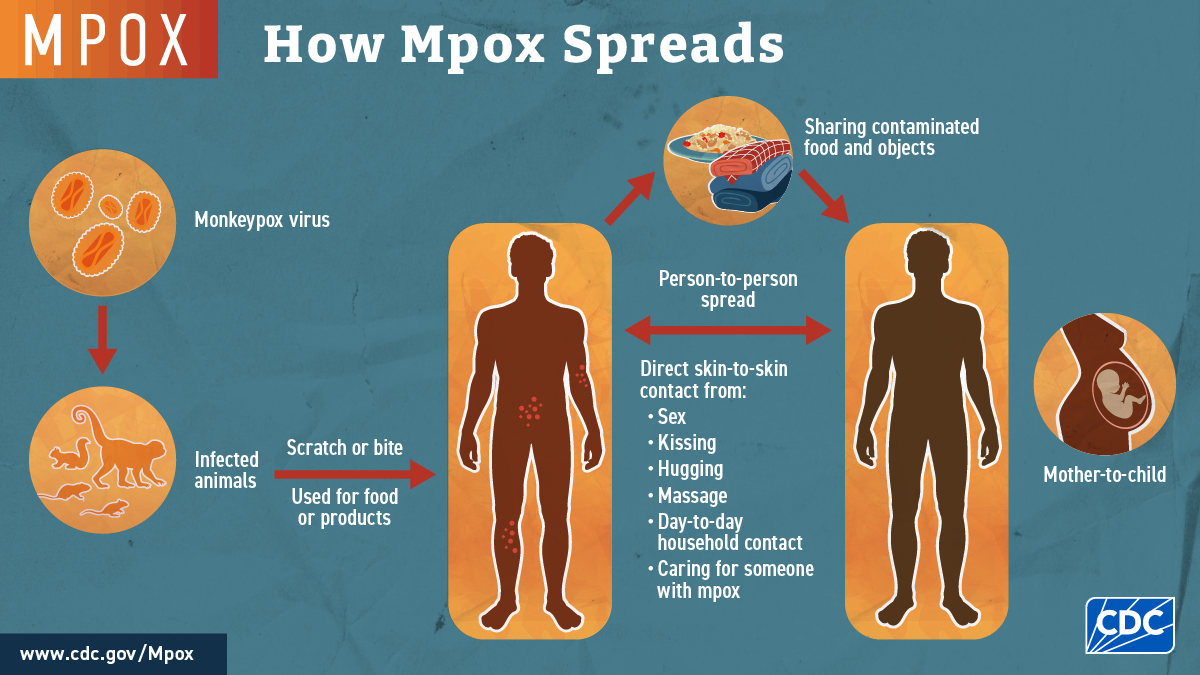Mpox
Mpox, formerly called monkeypox, is a disease caused by a virus and is similar to smallpox. It causes flu-like symptoms such as fever and chills and a rash that can last for several weeks. Mpox is spread through close or intimate contact with a person with Mpox, direct contact with an infected animal, or contact with contaminated objects. Mpox can be spread to others from the time symptoms begin until the rash is fully healed. There is no treatment for Mpox, but it usually goes away on its own in 2-4 weeks. The Centers for Disease Control (CDC) recommends vaccination for people at higher risk for Mpox.

Symptoms
People with Mpox often have a rash that may present on the hands, feet, chest, face, or mouth, or near the genitals including the penis, testicles, labia, vagina, and anus. The rash may initially look like pimples or blisters and may be painful or itchy. Some people have a widespread rash, but others may only have a few bumps or blisters. The Mpox rash can go through several stages over 2-4 weeks before healing.
Mpox may also cause flu-like symptoms such as fever, chills, sore throat, nasal congestion, headache, cough, muscle aches, fatigue, and swollen lymph nodes. Symptoms typically begin within 21 days of exposure to the virus. If a person infected with Mpox has flu-like symptoms, it’s likely they will develop a rash within 1-4 days.
Risk Factors
Anyone can get Mpox, although the global outbreak appears to be disproportionately affecting men who have sex with men (MSM). People in the United States may be at higher risk of exposure if they:
- Have had sex within the past 2 weeks with someone who is diagnosed with Mpox.
- Have had sex at a sex club, bathhouse, or other commercial sex venue in the past 6 months.
- Have had sex at an event or location where Mpox is spreading.
- Have a sex partner who’s been in any of the aforementioned situations.
- Have been diagnosed with one or more sexually transmitted infection (STI) in the past 6 months.
- Have had sex with more than one person in the past 6 months.
People might be more likely to get severely ill with Mpox if they have a weakened immune system, particularly when it’s caused by HIV, have a history of eczema, or are pregnant.
Complications
Complications of Mpox can include bacterial infections, loss of vision or eye damage from ocular Mpox, myopericarditis (inflammation around the heart), encephalitis (inflammation in the brain), pneumonia, respiratory distress (extreme difficulty breathing), or severe scarring.
When to Seek Care
People who might be sick with Mpox should seek medical evaluation immediately. Mpox is diagnosed by a healthcare provider using PCR swab testing from the lesions and blood tests.
Treatment
There are no antiviral treatments for Mpox; however, there may be options available for some people with a weakened immune system or active skin conditions, or who are pregnant/breastfeeding. Treatment of Mpox focuses on monitoring by a healthcare provider and symptom management including use of over-the-counter medicines and increasing rest and fluid intake. It is also important to avoid spreading the rash to other parts of the body by not touching or scratching the rash, avoiding popping the lesions, and not shaving areas where the rash is present.
Topical creams such as calamine lotion or petroleum jelly or gels with benzocaine or lidocaine can provide temporary relief from itching and pain. Oral antihistamines such as diphenhydramine (Benadryl) may also provide temporary relief from itching. Soaking in warm baths using oatmeal or other over the counter products can provide some relief for the itchy, dry feeling that can accompany the rash. People with a rash in the genital/anal area may also benefit from a sitz bath. Those with an Mpox rash in their mouth can rinse with salt water several times per day or use prescription mouthwash or oral medications prescribed by their medical providers to manage pain and keep the mouth clean.
People with Mpox should reduce the risk of spreading the disease to others by isolating at home until the rash has healed, wearing a mask (N95 or KN95) when required to be around others, covering small areas of ulcers/sores with gauze or bandages, avoiding sharing objects such as towels or cups, cleaning shared surfaces often, covering furniture that cannot be laundered, avoiding contact with pets as Mpox can be spread between humans and animals, and washing hands often with soap and water, especially after contact with the rash. Most people with Mpox fully recover in 2-4 weeks.
Prevention
The CDC recommends that people at higher risk of exposure get vaccinated for Mpox. It is important to get vaccinated before, or as soon as possible after, exposure. Learn more about the Mpox vaccine.
Resources
